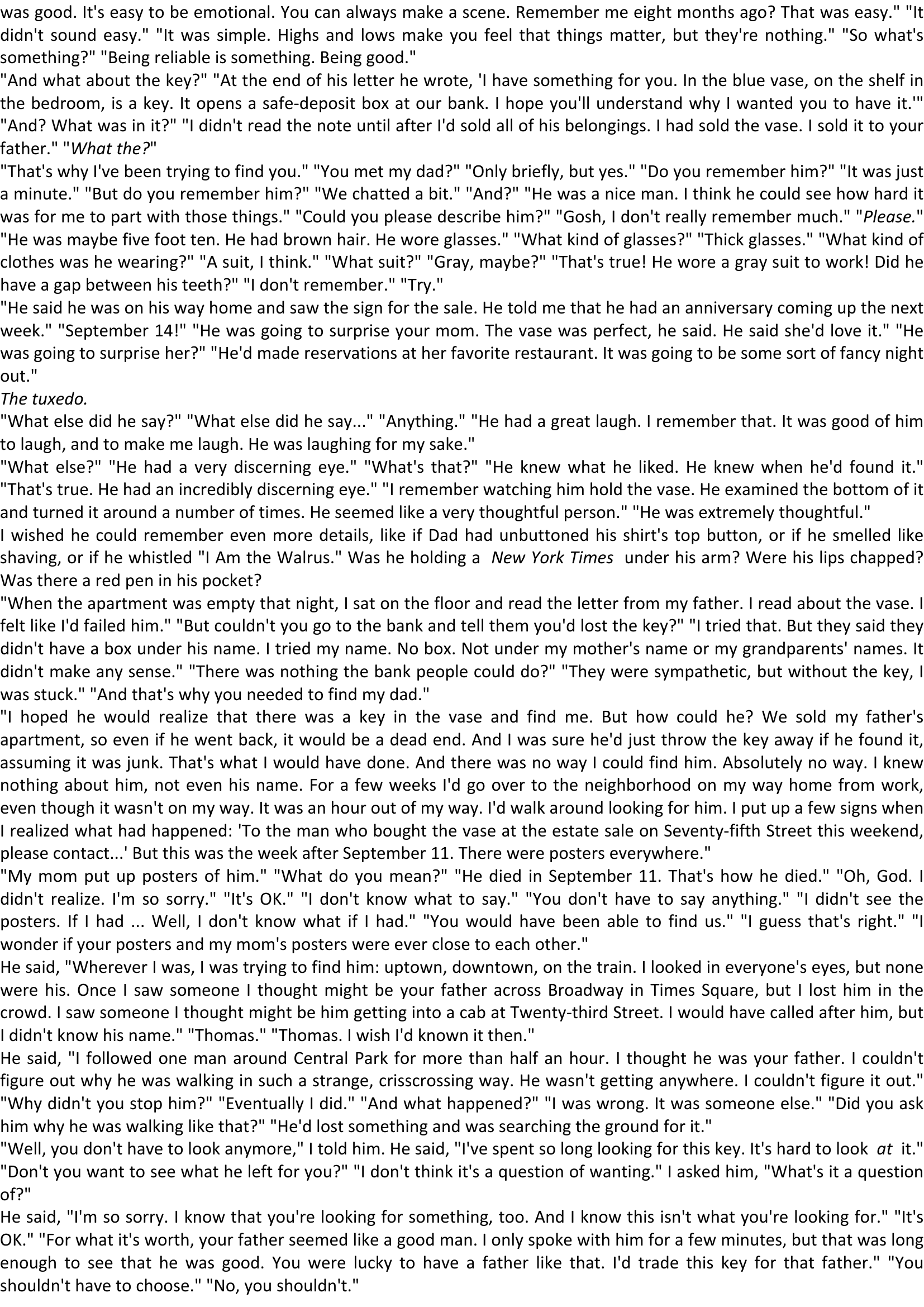"Which was this.
Publié le 06/01/2014

Extrait du document
«
was
good.
It'seasy tobe emotional.
Youcanalways makeascene.
Remember meeight months ago?Thatwaseasy." "It
didn't sound easy.""Itwas simple.
Highsandlows make youfeel that things matter, butthey're nothing." "Sowhat's
something?" "Beingreliable issomething.
Beinggood."
"And what about thekey?" "Atthe end ofhis letter hewrote, 'Ihave something foryou.
Inthe blue vase, onthe shelf in
the bedroom, isakey.
Itopens asafe-deposit boxatour bank.
Ihope you'll understand whyIwanted youtohave it.'"
"And? Whatwasinit?" "Ididn't readthenote untilafter I'dsold allofhis belongings.
Ihad sold thevase.
Isold itto your
father." " What
the? "
"That's whyI'vebeen trying tofind you." "Youmetmydad?" "Onlybriefly, butyes." "Doyouremember him?""Itwas just
a minute." "Butdoyou remember him?""Wechatted abit." "And?" "Hewas anice man.
Ithink hecould seehow hard it
was forme topart with those things." "Couldyouplease describe him?""Gosh, Idon't really remember much."" Please.
"
"He was maybe fivefoot ten.Hehad brown hair.Hewore glasses." "Whatkindofglasses?" "Thickglasses." "Whatkindof
clothes washewearing?" "Asuit, Ithink." "Whatsuit?""Gray, maybe?" "That'strue!Hewore agray suittowork! Didhe
have agap between histeeth?" "Idon't remember." "Try."
"He said hewas onhis way home andsaw thesign forthe sale.
Hetold methat hehad ananniversary comingupthe next
week." "September 14!""Hewas going tosurprise yourmom.
Thevase wasperfect, hesaid.
Hesaid she'd loveit.""He
was going tosurprise her?""He'd made reservations ather favorite restaurant.
Itwas going tobe some sortoffancy night
out."
The
tuxedo.
"What
elsedidhesay?" "What elsedidhesay..." "Anything." "Hehad agreat laugh.
Iremember that.Itwas good ofhim
to laugh, andtomake melaugh.
Hewas laughing formy sake."
"What else?""Hehad avery discerning eye.""What's that?""Heknew whatheliked.
Heknew when he'dfound it."
"That's true.Hehad anincredibly discerning eye.""Iremember watchinghimhold thevase.
Heexamined thebottom ofit
and turned itaround anumber oftimes.
Heseemed likeavery thoughtful person.""Hewas extremely thoughtful."
I wished hecould remember evenmore details, likeifDad hadunbuttoned hisshirt's topbutton, orifhe smelled like
shaving, orifhe whistled "IAm theWalrus." Washeholding a New
YorkTimes under
hisarm? Were hislips chapped?
Was there ared pen inhis pocket?
"When theapartment wasempty thatnight, Isat onthe floor andread theletter frommyfather.
Iread about thevase.
I
felt like I'dfailed him.""Butcouldn't yougotothe bank andtellthem you'd lostthekey?" "Itried that.Butthey saidthey
didn't haveabox under hisname.
Itried myname.
Nobox.
Notunder mymother's nameormy grandparents' names.It
didn't makeanysense." "Therewasnothing thebank people coulddo?""They weresympathetic, butwithout thekey, I
was stuck." "Andthat's whyyouneeded tofind mydad."
"I hoped hewould realize thatthere wasakey inthe vase andfind me.Buthow could he?Wesold myfather's
apartment, soeven ifhe went back, itwould beadead end.AndIwas sure he'd justthrow thekey away ifhe found it,
assuming itwas junk.
That's whatIwould havedone.
Andthere wasnoway Icould findhim.
Absolutely noway.
Iknew
nothing abouthim,noteven hisname.
Forafew weeks I'dgoover tothe neighborhood onmy way home fromwork,
even though itwasn't onmy way.
Itwas anhour outofmy way.
I'dwalk around looking forhim.
Iput upafew signs when
I realized whathadhappened: 'Tothe man whobought thevase atthe estate saleonSeventy-fifth Streetthisweekend,
please contact...' Butthis was theweek afterSeptember 11.There wereposters everywhere."
"My mom putupposters ofhim." "What doyou mean?" "Hedied inSeptember 11.That's howhedied." "Oh,God.
I
didn't realize.
I'msosorry." "It'sOK." "Idon't know whattosay." "Youdon't havetosay anything." "Ididn't seethe
posters.
IfIhad ...Well, Idon't know whatifIhad." "Youwould havebeen abletofind us.""Iguess that's right." "I
wonder ifyour posters andmymom's posters wereeverclose toeach other."
He said, "Wherever Iwas, Iwas trying tofind him: uptown, downtown, onthe train.
Ilooked ineveryone's eyes,butnone
were his.Once Isaw someone Ithought mightbeyour father across Broadway inTimes Square, butIlost him inthe
crowd.
Isaw someone Ithought mightbehim getting intoacab atTwenty-third Street.Iwould havecalled afterhim,but
I didn't knowhisname." "Thomas." "Thomas.Iwish I'dknown itthen."
He said, "Ifollowed oneman around Central Parkformore thanhalfanhour.
Ithought hewas your father.
Icouldn't
figure outwhy hewas walking insuch astrange, crisscrossing way.Hewasn't getting anywhere.
Icouldn't figureitout."
"Why didn't youstop him?" "Eventually Idid." "And what happened?" "Iwas wrong.
Itwas someone else.""Didyouask
him why hewas walking likethat?" "He'dlostsomething andwas searching theground forit."
"Well, youdon't havetolook anymore," Itold him.
Hesaid, "I'vespent solong looking forthis key.
It'shard tolook at it."
"Don't youwant tosee what heleft foryou?" "Idon't thinkit'saquestion ofwanting." Iasked him,"What's itaquestion
of?"
He said, "I'msosorry.
Iknow thatyou're looking forsomething, too.AndIknow thisisn't what you're looking for.""It's
OK." "Forwhat it'sworth, yourfather seemed likeagood man.
Ionly spoke withhimforafew minutes, butthat waslong
enough tosee that hewas good.
Youwere lucky tohave afather likethat.
I'dtrade thiskeyforthat father." "You
shouldn't havetochoose." "No,youshouldn't.".
»
↓↓↓ APERÇU DU DOCUMENT ↓↓↓
Liens utiles
- Robinson Crusoe (extrait) Daniel Defoe (...) In a little time I began to speak to him, and teach him to speak to me; and, first, I made him know his name should be Friday, which was the day I saved his life.
- Helios (Helius) (The sun god) Greek Helios was husband to Rhodos, the Nymph of the island of Rhodes, which he chose as his favored abode.
- Dictynna (Lady of the Nets) Greek An ancient Cretan goddess, perhaps the goddess of Mount Dicte, which was later known as the birthplace of the Greek god Zeus.
- West Side StoryWest Side Story, motion-picture musical about star-crossed lovers from different cultures in New York City, based on the 1957 stage play by Arthur Laurents andJerome Robbins, which was inspired by Romeo and Juliet (1595?
- Luciano PavarottiIINTRODUCTIONLuciano PavarottiRenowned Italian tenor Luciano Pavarotti was known for his mastery of the highest notes of a tenor's range and for hisjovial personality, which helped him earn a wide popular following.








